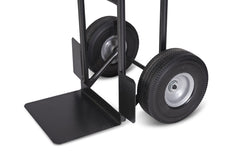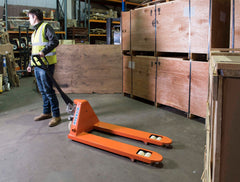Wheels and Castors
More information about Wheels and Castors
Heavy-Duty Wheels and Castors
Discover our extensive range of superior quality Wheels and Castors, designed to meet the diverse needs of various industries. Our collection includes a variety of large castor wheels that are perfect for those heavy-duty applications where durability and stability are paramount. These wheels are designed to bear substantial loads and ensure smooth mobility, making them an ideal choice for businesses looking for reliable and efficient mobility solutions.
Our heavy-duty castor wheels are engineered to withstand the rigours of industrial use, providing excellent performance even in the most challenging environments. They are crafted from robust materials that ensure longevity, reducing the need for frequent replacements and thereby offering excellent value for your business. Whether you're in the manufacturing, hospitality, healthcare, or any other sector, our Wheels and Castors can enhance your operations by providing the mobility and durability you need.
Explore our range of Wheels and Castors today and find the perfect match for your business requirements. With our commitment to quality, performance, and customer satisfaction, we are confident that our products will exceed your expectations and contribute to the success of your business.
Understanding Wheels and Castors
Wheels and castors are fundamental components that restore mobility to items like trucks and trolleys. Opting to replace a faulty wheel or castor is a cost-effective alternative to purchasing a new trolley and can significantly improve the manoeuvrability of older trucks, enhancing operational efficiency. Whether it's for a repair or a new mobile project, there's a vast array of sizes, materials, and types such as swivel or braked castors, to choose from.
Advantages of Using Wheels and Castors
Wheels and castors offer a practical solution to the challenging task of moving heavy machinery and large loads. Large castor wheels, for instance, can safely carry substantial loads, with some options like the solid rubber wheels with pressed steel centres boasting an impressive maximum load of 205kg. Furthermore, castors provide a full range of movement and easy turning, making the transportation of platform trucks and trolleys quick and hassle-free.
Things to Consider
- Quality and Durability: When purchasing wheels and castors, it is crucial to consider the quality and durability of the product. Look for reputable brands or manufacturers that are known for producing high-quality items that can withstand heavy use and provide long-lasting performance.
- Load Capacity: Determine the maximum load capacity required for your specific application. Consider the weight of the items that will be transported or supported by the wheels or castors and ensure that the chosen product can handle the load without compromising safety or performance.
- Wheel Material: Different wheel materials offer varying levels of durability and functionality. Consider the specific requirements of your application and choose a wheel material that suits it best. For example, polyurethane wheels are known for their excellent load-bearing capacity and resistance to wear, while rubber wheels provide good shock absorption and floor protection.
- Wheel Diameter and Tread Width: The diameter and tread width of the wheels or castors should be selected based on the intended use and the surface on which they will be used. Larger-diameter wheels are generally better for uneven terrain or outdoor use, while smaller-diameter wheels are more suitable for indoor applications with smooth surfaces.
- Swivel and Locking Mechanisms: If the wheels or castors need to provide Manoeuvrability, consider the swivel mechanism. Look for smooth and reliable swivel action that allows for easy movement in any direction. Additionally, if stability is required, check for locking mechanisms to securely hold the wheels in place.
- Noise and Vibration: Depending on the application, it may be important to consider the noise and vibration levels produced by the wheels or castors. Look for products that are designed to minimise noise and vibration, especially in environments where these factors can be disruptive or harmful.
- Compatibility: Ensure that the chosen wheels or castors are compatible with the equipment or furniture they will be attached to. Consider factors such as mounting options, hole patterns, and overall dimensions to ensure a proper fit and easy installation.
- Maintenance and Cleaning: Consider the ease of maintenance and cleaning for the chosen wheels or castors. Look for products that are easy to clean and maintain, as this can contribute to their longevity and overall performance.
Frequently Asked Questions
What is the difference between wheels and casters?
Wheels and castors are both essential components used for mobility and transportation purposes. The main difference between the two lies in their design and functionality.
Wheels are typically standalone circular objects that rotate on an axle, allowing objects to roll smoothly in a straight line. They are commonly used on carts, trolleys, and other equipment that require linear movement. Wheels are available in various sizes, materials, and designs to suit applications and load capacities.
On the other hand, castors are wheel assemblies that include a wheel mounted on a swivel or rigid frame. The frame, often called caster housing, allows the wheel to rotate 360 degrees, providing greater Manoeuvrability and versatility. Castors are commonly used on furniture, office chairs, and equipment that require multidirectional movement. They come in different types, such as swivel castors, fixed castors, and braked castors, to cater to specific needs.
In summary, while wheels are standalone circular objects for linear movement, castors are wheel assemblies that offer multidirectional mobility. Both wheels and castors play vital roles in various industries, and choosing the right option depends on the specific requirements of your application.
What kind of caster wheels do I need?
When choosing the right caster wheels for your needs, there are a few factors to consider. Firstly, you should consider the load capacity the wheels will need to support. This will determine the size and material of the wheels. Consider steel or nylon wheels for heavier loads, while lighter loads can be handled by plastic or rubber wheels.
Next, think about the type of surface the wheels will be rolling on. You can opt for hard wheels if you're using them on a smooth floor, like in an office or warehouse. However, if you are using them on uneven or rough surfaces, such as in a workshop or outdoor environment, you should consider softer wheels with more grip, like rubber ones.
Additionally, consider the mobility you require. If you need the ability to swivel and manoeuvre easily, choose swivel casters. On the other hand, if you need stability and straight-line movement, fixed casters will be more suitable.
Lastly, remember to check the mounting options for the caster wheels and ensure they are compatible with your equipment or furniture.
By considering these factors, you can select the perfect caster wheels that will meet your specific needs and ensure smooth and efficient movement.
How do I know what size casters I need?
Determining the right size casters for your needs is crucial to ensure smooth and efficient movement. To determine the correct size, you should consider a few factors. Firstly, you need to assess the load capacity of the casters. This refers to the maximum weight that the casters can support. Choosing casters that can comfortably handle the weight of your equipment or furniture is important.
Secondly, you should consider the type of surface the casters will be used on. Different surfaces require different types of casters. For example, hard surfaces like concrete or tile may require casters with a harder wheel material, while softer surfaces like carpet may require softer ones.
Lastly, you need to determine the caster wheel size. This is typically measured in inches and refers to the diameter of the wheel. Larger wheels generally provide better mobility and stability, especially over uneven surfaces.
By considering these factors and consulting our expert team, you can ensure that you select the right size casters for your specific needs.
First Mats Choice
-
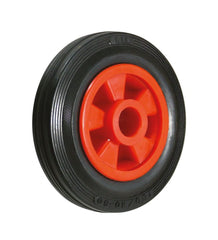 Solid Rubber Wheels with Plastic Centres - Plain Bore
Solid Rubber Wheels with Plastic Centres - Plain Bore

["Max weight tolerance 350kg","Black solid rubber tyre","Wheel diameters from 160mm - 400mm"]
2 to 3 working days £10.00 Excl. VAT -
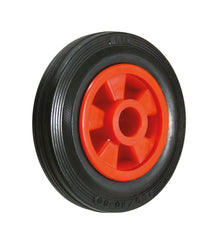 Solid Rubber Wheels with Plastic Centres - Roller Bearing
Solid Rubber Wheels with Plastic Centres - Roller Bearing

["Max weight tolerance 350kg","Black solid rubber tyre","Diameters from 200mm - 400mm"]
2 to 3 working days £11.60 Excl. VAT -
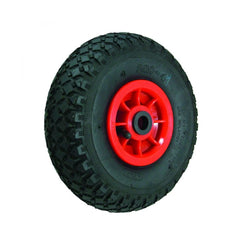 Pneumatic Rubber Tyre Wheels - Plain Bore
Pneumatic Rubber Tyre Wheels - Plain Bore

["Max. weight tolerance: 200kg","Black colour pneumatic tyre","Wheel diameters: 260 - 400mm"]
2 to 3 working days £22.00 Excl. VAT







